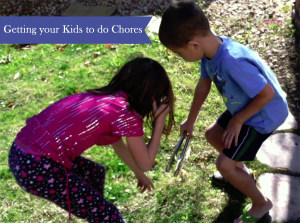 So many kids today do not have a very good work ethic. They expect that good things should come to them without much effort on their part. Chores may be one of the greatest things that help kids learn how to make contributions that benefit others. Getting kids to do chores helps them build character and helps them be successful in life and in relationships.
So many kids today do not have a very good work ethic. They expect that good things should come to them without much effort on their part. Chores may be one of the greatest things that help kids learn how to make contributions that benefit others. Getting kids to do chores helps them build character and helps them be successful in life and in relationships.
So how do we get kids to do chores? Is it possible to get them to do chores without using reminders, warnings, or threats? Absolutely! However, the approach that a parent uses may make a big difference in the child’s attitude toward chores.
Go and do your chores approach
I can remember as a kid that chores seemed overwhelming. During a time when I lived with my grandmother, she would send me outside to mow her lawn. After 2 ½ hours of mowing her huge lawn set on a hill with a push lawnmower, I would come inside the house to rest. If my grandmother saw me resting, she would ask why I was inside when the lawn wasn’t done. I would respond by telling her that I had finished mowing the lawn. She would respond by saying the trimming was part of mowing the lawn and that I needed to go back out there and finish. After another hour of trimming I would return inside the house only to be sent outside again to weed – because, of course, “weeding is part of doing the lawn also.”
As a child, I learned to either take my time while doing the yard work hoping that it would get too dark to see and I could quit, or I would try to hide and avoid people on Saturday and just hope that I could get away from a never-ending chore.
When my own kids got old enough to start doing chores, I found myself using my mother and grandmother’s approach to getting my children to do chores. I would tell them what to do and when to have it done by. Because they were little and didn’t have a lot of experience completing tasks, they would doddle around instead of completing the tasks in a timely manner. I would then feel irritated that they weren’t doing what they were supposed to be doing, especially when it wasn’t a difficult task. The whole experience would usually turn out to be pretty negative. I was unhappy. They were unhappy. And the chores seemed to last forever.
The team approach
My wife had a very different experience doing chores. Whereas I was told what job to do and sent off to complete it on my own, my wife’s family would make a list and break up into teams to get jobs done. They loved checking off each job on the lists as they finished it. The chores would usually only take them a few hours Saturday morning to complete and then they had the rest of the day to play.
Putting it into practice
After some time of watching me fail, my wife decided to use the approach that she learned growing up. She started to break down the jobs into small accomplishable steps and then break the kids up into teams to get each part done until all the jobs were complete. She would do the task with the kids and talk with them while she did it. Our kids responded much better to the way she approached getting them to do chores than the way I approached it.
Watching my wife teach our kids how to do chores made me realize that sometimes kids get overwhelmed when they don’t know how or where to begin doing their chores. I also realized that when we send our kids away to do difficult tasks by themselves, they may not have the skills necessary to organize the tasks into smaller, more accomplishable pieces. And if we get angry with them if they avoid chores or doddle, our kids may associate doing chores with negative experiences or parental anger and become more resistant over time.
So while kids are still young and learning, instead of sending them away to do chores, parents can use the team approach by helping their kids learn how to organize large tasks into smaller ones and how to work together to accomplish those tasks. Families that do this may find that chores become less miserable and kids become more helpful and willing to contribute for the benefit of the family.
 Shiloh Lundahl, LCSW, is a child and family therapist in Gilbert and Mesa, Arizona. He is the founder of Parent Arizona and Counseling Services and is part of the Arizona Family Therapy Group.
Shiloh Lundahl, LCSW, is a child and family therapist in Gilbert and Mesa, Arizona. He is the founder of Parent Arizona and Counseling Services and is part of the Arizona Family Therapy Group.
He provides parenting classes using the Love and Logic curriculum, classes for parents of children with ADHD, step-parenting classes, and advanced trainings for foster and adoptive parents. He also provides in-home therapy in Gilbert, Mesa, Queen Creek, San Tan Valley, and Chandler, Arizona.
